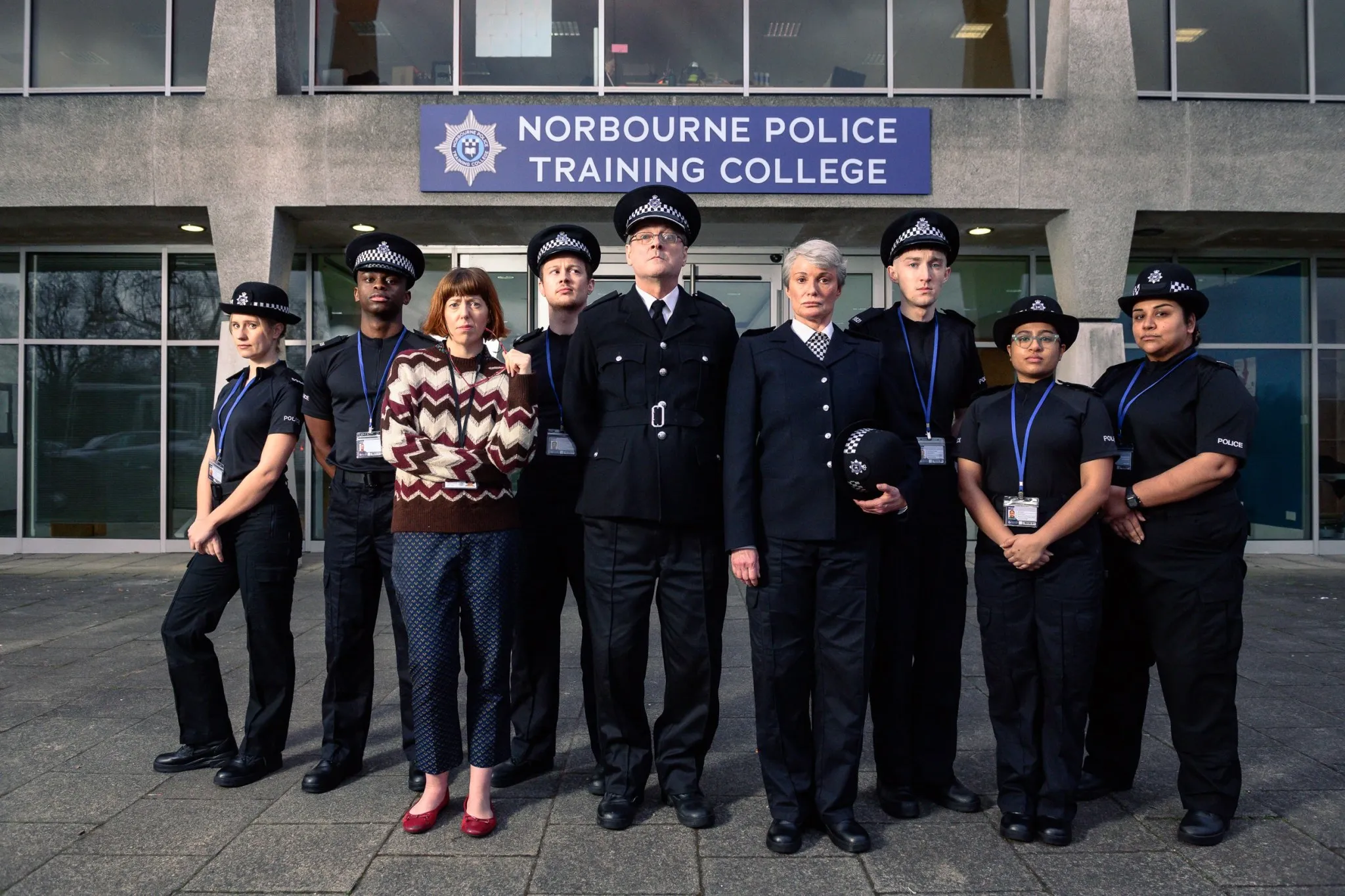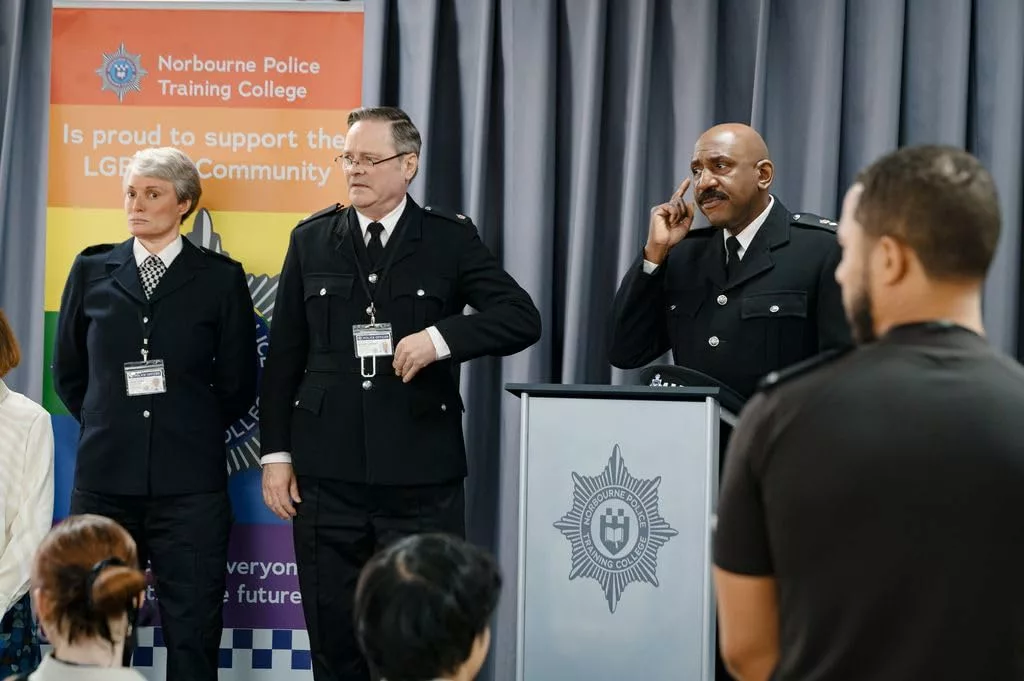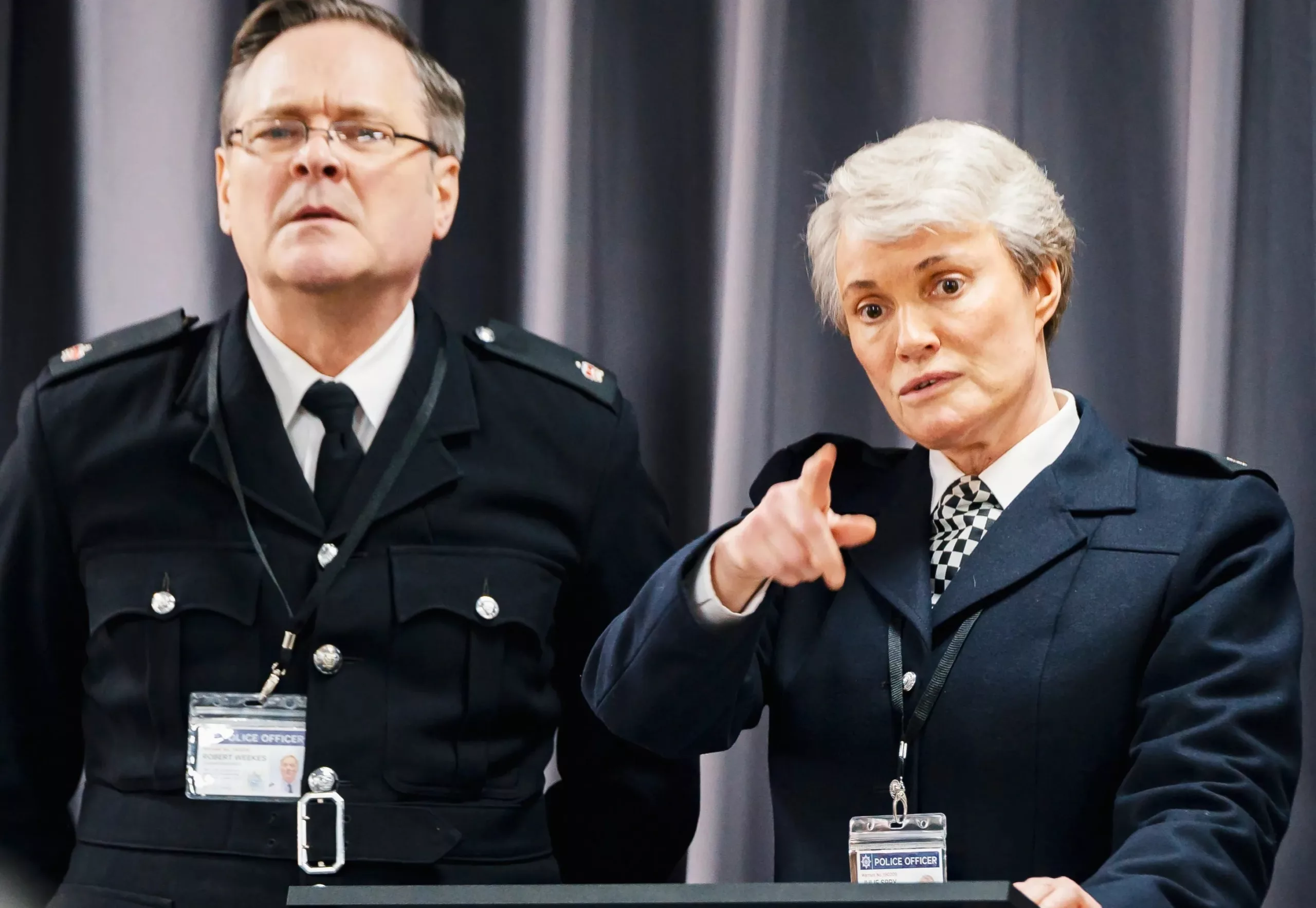When ITV announced Piglets, a new sitcom about rookie police recruits, reactions ranged from intrigue to indignation. Its creators hinted at humor with heart, yet its title upset some. Premiering, would it back bite or charm?
Set at Norbourne Police College, six trainees prep under strict superintendents Spry and Weekes. Steph and ex-Mike face past tensions. Leggo coasts on family ties, while Afia, Geeta, and Dev aim to prove themselves. Then there’s Paul, sent by his criminal kin to infiltrate.
With origins in Green Wing and Smack the Pony’s inventive absurdity, potential existed for Piglets to pierce policing’s pomposity through laughs. However, controversy clouded early judgments. Its name, invoking pigs as a slur against officers, disturbed some, given the real-world pressures they face.
This review aims to assess piglets on their own merits. How do its characters, comedy, and commentary come together? Does it find farcical fun or flounder in failed frivolity? With scrutiny sensitive to both creative license and life’s complexities, perhaps a fair evaluation can emerge for those curious about this curious comedy.
Feeble Foundations
Piglets introduces plenty of potential with its police trainee premise. However, it fails to effectively establish characters or craft a compelling overarching plot. Across six episodes, the show merely sketches scenarios without substance.
We’re introduced to a batch of recruits, each fitting predictable archetypes. Steph is the boy-crazed ex-girlfriend following Mike, her trainer. Leggo rides family ties into the force. Afia, Geeta, and Dev join with earnest aims but receive little focus to make them feel multi-dimensional. Paul stands out as the mole planted by his criminal family, yet even his intriguing background isn’t greatly explored.
As trainers, Bob and Julie could offer nuance through their differing styles. But Bob serves solely for slapstick, while Julie functions as a one-note angry chief with no layers. Supporting faces like Melanie introduce quirks yet leave us knowing little of their motivations or personalities beneath surface traits.
Flitting between loose storylines, not one grips us episode over episode. Initial intrigue around finding the “mole” fizzles without suspense as the obvious culprit faces no suspicion. Subplots like a rivalry for promotion or run-ins with past connections feel obligatory rather than compelling.
No character grows or changes in meaningful ways. Steph stays obsessed with Mike while he remains a one-dimensional ladies’ man. Paul acts as bumbling comic relief, though his situation begs complexity. Bob and Julie lack dimension from onset to finish.
With so much potential in its premise and setting, Piglets could have challenged assumptions or offered insight. Instead, its characters are costumes without contents. Plots are thin devices lacking drive or consequence. The season finishes as it starts, introducing faces and ideas without substance or spark to make us care about its world. For a comedy about policing, more depth was needed to hit the funny bone or make its satire sting.
Laughing Through the Pains
Piglets aims to captivate with its cast of hapless police recruits and trainers embroiled in comedic folly. Yet viewers are left sorely wanting for consistent laughs. The sitcom’s attempts at humor range from clever wordplay to crass gags that induce groans, not grins.
Much comedy stems from characters’ dim-witted nature and ineptitude for their roles. Paul bumbles through tasks, oblivious to schemes unfolding around him. Superintendent Weekes drifts through scenes resembling an addled ghost of competence from the from the past. There are alluring roots for running jokes about inept police work.
When humor hits, it does so with a smile. Weekes musing on recruits as “lusting lambs” draws a chuckle for its creative absurdity. Steph and Mike’s antagonism conjures relatable fun examining toxic relationships. Wit shines through in these moments that feel animated by authentic human sparks rather than just punchlines.
Alas, too much relies on crude punchdowns lacking bite or purpose. Crass jokes about masturbation or sexuality fall flat, prioritizing shock over craft. Such risqué themes require deft handling for success, which Piglets’ writers cannot offer.
Comparisons to precedent like Green Wing are inevitable yet unfair. That series combined absurdity and heart so perfectly that its madcap world felt real. Piglets’ characters lack dimension beyond easy targets. Their humor serves shallow spoof over the meaningful commentary its premise could provide.
Had Piglets sharpened its satire to dissect policing issues with bites or fleshed out farces with hearts, it may have soared. As is, viewers watch, waiting to be pulled in, only to leave feeling strangely unfulfilled. The show proves that even the funniest of premises require mastery of humor, not just its throwing, to truly entertain. With edits and experience, Piglets’ team could hone their comedic skills. For now, however, the jokes are no match for the pain.
Truth and Absurdity
Piglets strived for absurdist humor yet largely steered clear of seizing opportunities for satire. With recent scandals rocking British police forces, the show faced pressure to offer insight, which many felt it failed to meet.
Many viewed the Police Academy favorably for pulling a few punches in spoofing law enforcement tropes and protocol. While not a searing indictment, its gags held funhouse mirrors to real procedures in a style that made audiences chuckle and think.
Conversely, Piglets’ jokes felt too steeped in crass stereotypes and cliches to leave a meaningful aftertaste. Nodding to toxic behaviors like one officer’s vague past wrongdoing only raised eyebrows without substance. Criticisms were valid because the series leaned on absurd premises without mining them for commentary.
Shows tackling similar subjects found success in plumbing the depths of truth within absurdity. The BBC’s This Country humorously veils on a community’s unseen struggles through its buffoonish characters. Meanwhile, Michaela Coel’s I May Destroy You blended heaviness with laughter to spark real conversations.
Had Piglets fused frivolity with timely social insights, it might have satisfied both those seeking escapism and those hoping police satire matured past lazy stereotypes. Its talented cast and crew hinted at the potential for blending silliness with something substantial worth chewing on. With refinement, future seasons could strike a balance between absurdity and arduous truths to entice and enlighten.
Light Touch versus Heavy Hand
While Piglets boasted talent in front of and behind the camera, its technical execution felt uninspired at times. Director Johanna Edwards opted for a pacy, cinematic style carried over from prior comedies. Yet fast cuts and frequent visual gags failed to elevate subpar material.
Performers did their best despite characters lacking dimension. Sarah Parish commanded scenes as no-nonsense chief Spry. But an overly abrasive persona and peculiar makeup left her humor feeling forced. Mark Heap shone in the unenviable role of bumbling Bob Weekes. Still, his pratfalls and malapropisms struggled to mask formulaic writing.
Costuming recycled police tropes without conveying any insight. Recruits dressed the stereotypical part but emerged as fools, not full people. Physical comedy derives more from slapstick than believable situations. Slow scenes diluted the pace without adding layers.
Piglets tried exploiting prior success through mimicry over originality. Imitating the quirks of shows like Green Wing proved no substitute for fresh perspective. When parody outweighed commentary, the end result fell flat instead of flying high.
With a lighter touch and a focus on character, these talented folks might have uncovered richer comedy. As is, production values became burdened under the weight of genre expectations. A simpler approach balancing heart and humor could have served all talents far better.
Not Ready for Roll Call
Overall, I give Piglets a poor evaluation. While talented comedic actors and writers were involved, the end result didn’t live up to its creative ancestry.
The sitcom aspired to Green Wing’s surreal style but lacked its predecessor’s heart. Characters emerged as cardboard cutouts rather than people. Jokes fell flat more often than landings. When it tried social commentary, the tone felt uneven.
A few performers, like Sarah Parish as the gruff chief, injected moments of humor. But weak scripting stifled their talents. Plots ambled through predictable paces with little spark. Attempts at absurdity came across as strained rather than natural.
Compare this to beloved past works, and Piglets clearly missed the mark. Its creators’ past magic failed to recur here. Perhaps expectations overshadowed this project from the start. Or the concept lacked a vision that could evolve haphazard material into gold.
For comedy fans, there’s little reason to add Piglets to your watch list. One could browse social media instead and encounter livelier humor. Newer shows like Black Ops prove police settings can inspire wit when writers apply care, insight, and a rule-bending spirit.
Unless deep completionist tendencies compel you, piglets seem skippable. Half-baked jokes and tales leave little residue in the mind afterward. All I can suggest is to devote your time to productions that provoke bigger smiles and food for thought.
Not Ready for Duty
Let’s wrap this up. The aim was to judge if Piglets delivered a police comedy. By most accounts, it came up short.
Potential was there with talent involved, yet characters felt shallow. Jokes fell flat more often than not. The setting felt underexplored as commentary or a means for real humor.
This doesn’t bode well for future police sitcoms hoping to do better. Substance is needed, not just sight gags. Deeper looks at relevant issues could produce hilarity if they balance insight with entertainment.
Despite high hopes, the end result felt stale, like yesterday’s donuts. Moments of fun emerged but left little impact. Overall, it ranks as a miss more than a hit.
For comedy fans, your time may be better spent elsewhere. Other shows exist, offering more smiles for the same investment. As for Piglets, while it tried, the trainees remain unfinished—unready for duty in making audiences laugh. With luck, future projects will learn from their shortcomings.
The Review
Piglets
Piglets proved an unsuccessful venture into police sitcom territory. While boasting talented names behind the scenes, the finished product failed to conjure many laughs or insights. Characterization felt thin, and jokes fell flat more often than they landed. It lacked the heart and creativity of influences like Green Wing.
PROS
- Talented comedic actors like Mark Heap and Sarah Parish in lead roles
- An interesting police training academy setting with possibilities for humor
- Tried to continue the legacy of acclaimed comedies like Green Wing.
CONS
- Jokes and storylines fell flat more often than eliciting laughs.
- Characters lacked depth and felt like caricatures.
- Failed to provide meaningful commentary on policing issues
- Plotlines became repetitive and lost steam over episodes.
- did not live up to creative potential given those involved.




















































Discussion about this post